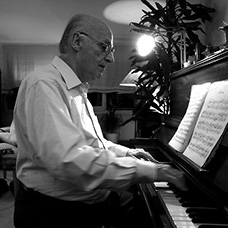Xavier Benguerel
Contemporary music
(Xavier Benguerel, Barcelona 1931)
Composer and son of the Catalan writer Xavier Benguerel i Llobet, he grew up in Chile, where his parents had to exile due to the Spanish Civil War. It was during this period that he began studying music. He started composing in the early 50s at the Conservatorio Nacional de Música in Santiago de Chile and was a student of Juan Orrego Salas. In 1954, he returned to Barcelona, where he would complete his training and have Cristòfor Taltabull as a teacher for a short time.
Initially quite influenced by serial music, his extensive catalogue officially opened with the Cantata d’amic i amat –based on the Llibre d’Amic e Amat by the 13th century Mallorcan writer Ramon Llull-, a serialist piece that premiered in Colònia on June 18, 1960, as part of the Festival de la Societat Internacional de Música Contemporània (SIMC). Since then, his work has been gaining more international attention, especially in Germany, and is now ongoing in his career, in large orchestra concerts and festivals, as well as in the recording studio. He is also one of the Spanish composers most performed and recorded from his generation.
After embracing the radical experimentation imposed by the avant-garde in the 50s, he searched for his own style by delving into a way of refining his writing through the essence of language, clarity and expressive sincerity. One of his most important pieces from his early stage is the series Estructures I-IV (1957-1966), for four solo instruments: violin, flute, cello and piano. Another one is Concert per a violoncel (1977). His close relationship with musicians such as the percussionists Siegfried Fink and Xavier Joaquín or the guitarist Siegfried Behrend has wonderfully resulted in such seductive pieces as Concert per a guitarra (1970), Versus (1970), Concert per a percussió (1975) and the expressive Música per a percussió i cordes (1990). The chamber opera Spleen, with libretto by Lluís Permanyer, premiered at the Teatre Condal de Barcelona on October 22, 1948, and thus opened a new artistic period of attraction for great forms and the search for a language with more dramatic impact. This is best manifested in triptych format for the oratorio Llibre vermell (1987), Rèquiem a la memòria de Salvador Espriu (1989) and Te Deum (1993), dedicated to the sculptor Josep Maria Subirachs.
Nonetheless, out of all these scores, his most internationally recognized piece has certainly been the Llibre vermell, inspired by the 14th century codex music conserved at the Abadia de Montserrat (Catalunya). This is a collection of songs and dances performed by the pilgrims who did the Camí de Sant Jaume to Galicia and which is considered to be a genre of its own. Parting from this material, Benguerel constructed a spectacular cantata that combined the original music with newly created symphonic and choral passages. The piece premiered at the Gran Teatre del Liceu on February 21, 1988, with vocals by the Escolania de Montserrat, with the Cor i Orquestra Simfònica del Gran Teatre del Liceu, and Antoni Ros Marbà as conductor. Ever since then and despite the number of challenges its performance presents, Llibre vermell has been performed more than fifteen times in Spain, France, Germany and Russia, and has been recorded four times. What Berenguel considers to be the best album recording of this score was the one conducted by Salvador Brotons leading the Coral Càrmina i l’Orquestra Simfònica de Barcelona i Nacional de Catalunya (OBC).
There are three pieces that truly showcase his artistic growth: 7 Faules de La Fontaine (1995), a pedagogic piece conceived for a reciter and two instruments; Missa Spirensis (1997), which premiered in Germany; his first Concert per a piano (2004), commissioned by the OBC. Through them, his creative language exposes much more variety in technique, great formal clarity and intense expressiveness, all giving an extraordinary communicative power and dramatic force to his music. In May 2008, the classical music magazine CD Compact awarded him the prize for Best Choral Recording for the version of Rèquiem a la memòria de Salvador Espriu, conducted by Miquel Ortega and performed by the Cor de Cambra del Palau de la Música Catalana, l’OBC and a notable group of vocal soloists (Columna Música). In light of the celebration “Any Espriu”, this work also inspired a staged musical show,coproduced by the Teatre Nacional de Catalunya, the OBC and the Auditori of Barcelona, conducted by Miquel Ortega himself and stage design by Xavier Albertí.
On June 8, 2011, his most ambitious lyrical score to date premiered at the Teatro Zarzuela de Madrid, titled Jo, Dalí (2001-2011). This is an opera in four acts, with a libretto by Jaime Salom, written under the commission of the Ministerio de Cultura to commemorate in 2004 the hundred year anniversary of Salvador Dalí’s birth. Even so, institutional setbacks kept putting off the premiere, which finally reached the stage thanks to a co-production with the Gran Teatre del Liceu and Musicadhoy. It was then set to premiere at the Liceu on October 19 of the same year, with Miquel Ortega as the conductor and Xavier Albertí in charge of stage artwork. A remarkable success, Jo, Dalí proved to be an exciting gift to commemorate the composer’s 80th birthday, with 2011 being a year marked by homages and acknowledgments given by various Spanish cities.
2011 was also an important year due to the release of an autobiographical piece titled Notes de la meva vida, published by the Editorial Boileau, as well as another piece about his career signed by the composer Tomás Marco. In addition to these two publications, Ars Harmonica released two albums featuring recent concert and chambers scores. Among them, Concert de Tardor, for guitar and string quartet (2005), premiered by the guitarist and composer Jaume Torrent; the series Palau d’hivern, for soprano, clarinet and string quartet (2005), based on poems written by the Catalan poet Àlex Susanna; 7 Poemes a la vora del foc (2008), based on poems of Mònica Pagès, and Fantasia dramàtica (2010).
In 2013, the composer has enriched his catalog with a new vocal cycle, Les flors del mal, based on three poems by Baudelaire, translated into Catalan by his father, Xavier Benguerel i Llobet, for soprano, baritone, children's choir and orchestra. The opening, by Tina Gorina soprano, baritone Patrice Berger, el Choeur d’enfants du Conservatoire de Perpignan i l'Orchestre Perpignan-Méditerranée, directed by Daniel Tosi, took place at the Théâtre de l'Archipel in Perpignan November 20.
All this work takes place in a stage of calm, fruitful and expressive artistic growth, far from any radical experimentation, in a constant process of refining language in search of a greater communicative power, through a clearer, more concise and comprehensive language, well able to impact an audience.




 twitter
twitter flickr
flickr facebook
facebook RSS
RSS spotify
spotify youtube
youtube
